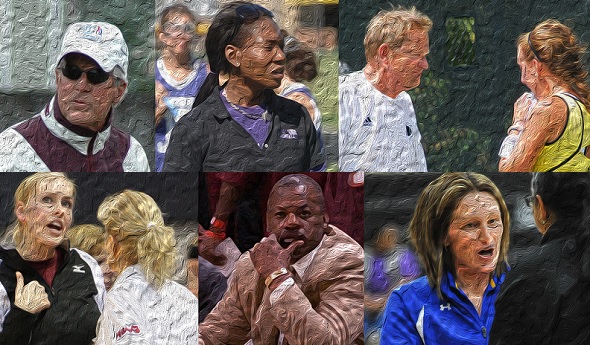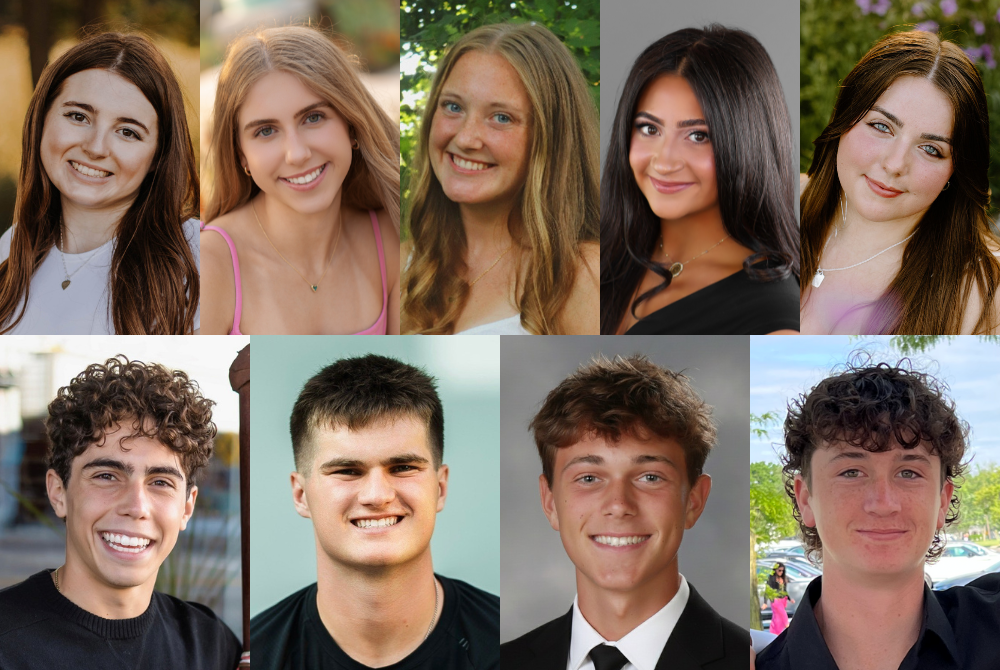
Valued Leaders Talk Sportsmanship
April 12, 2013
By Rob Kaminski
MHSAA benchmarks editor
Anyone who has attended an MHSAA sporting event has undoubtedly heard the public address announcements touting sportsmanship.
Sportsmanship is one of many lessons taught through school sports. But are today’s student-athletes the willing pupils in the subject? Or are too many kids opting for elective courses in showmanship offered via YouTube and cable networks?
While many involved in high school athletics have noticed a decline in sportsmanship, it’s not too late to inject this valuable ingredient back into our games. But efforts need to begin at the local level, and the scholastic environment needs to supplant community venues where poor sportsmanship often flourishes.
Seventeen coaches from all over the state chipped in to a benchmarks town hall discussion on sportsmanship.
East Kentwood’s Dave Emeott: “I think it is easy to see that sportsmanship is at least diminished. I think sportsmanship starts in the home, but we cannot always depend on the household to teach these lessons. As we sit in the stands, we realize that if this is where they learn it, then we need to get to work. I think we need to teach parents what a good sport looks like, as well as students. It is apparent that students will be the kind of sports they are permitted to be. Most coaches want good sportsmanship, but struggle with the balance of teaching character and winning or losing.”
Middleville Thornapple-Kellogg’s Tamara Benjamin: “Sportsmanship could be endangered. If a parent is allowed to sit in the stands and berate coaches, officials, and other athletes, it’s difficult for our students to see that this behavior is wrong because it is being tolerated. My expectations for our girls’ behavior are made clear the first day of practice. I hold them accountable for themselves, and we go forward each day.”
Holland’s Don Kimble: “I believe that it starts at home; always looking for a reason for failure opens the door to unsportsmanlike behavior. On our team, sportsmanship is stressed within the team first; if you cannot be a sportsman to your teammates, then you cannot be to others.”
Grand Haven’s Kimberly Vincent: “We’re all about sportsmanship and work with students and parents to set expectations. There are too many people pointing fingers at other people about this subject, and I think coaches have to set the example.”
Battle Creek Pennfield’s Mike Roach: “Youth sports programs need to concentrate on sportsmanship and the fact that there are winners and losers in sports. By not keeping score, the kids do not learn how to win, nor do they learn how to handle losing. Keep score. Teach kids that it is not the end of the world to lose, but be gracious in winning and losing.”
***
It could be true that much of the focus on poor sportsmanship is a result of just that: the spotlight on poor sportsmanship, rather than the good.
Thornapple-Kellogg’s Abby Kanitz: “I think that too much focus is put on the unsportsmanlike situations. There is much more good out there than bad; it just doesn't make for great stories. It does not take much more than one bad situation to ruin a game, competition or meet. I think sportsmanship comes from the coach. If your athletes know you have high expectations in this area, then their parents will know, too.”
Allegan’s Gary Ellis: “Sportsmanship is alive and well, though it is under attack. Students are exposed to so many examples of poor to horrendous sportsmanship on TV, that it seems to be the norm.”
Bloomfield Hills Andover’s David Zulkiewski: “I see positive sportsmanship every day with my athletes, and that’s because we focus on it and make it part of our daily practice and competition. Our team is much more than swimming or diving; it’s about excelling at life. So many of our kids will not compete in athletics after high school, so we try to give them skills they can use in the real world. Being a good sport is one of those skills.”
Grand Haven’s James Richardson: “Kids want and need structure, and will uphold the guidelines as long as they are clearly defined and enforced consistently. As coaches we need to build relationships with the kids and teach them proper behavior, and serve as models for them.”
Holt’s Mike Van Antwerp: “Sportsmanship is still around. If kids respect their opponents as individuals, they are good sports. Most of them would get along well if they were on the same team, so it’s important they realize that. The kids they play against are no different from them. If they respect the game, respecting their opponent follows.”
***
To be sure, no coach worth his or her clipboard sets out to allow poor sportsmanship. But emphasizing proper conduct early and often should be as essential as conducting tryouts.
Munising’s Cathy Mutter: “Sportsmanship is an important part of high school sports and life in general. I always tell my athletes, ‘You do not deserve; you earn. You have to work hard, be positive and be fair.’ I teach them to strive to be the best they can be on the team, in the classroom, at the jobs they have, and at home in their family life. Many programs struggle due to the fact they do not work together as a unit. You are only as strong as your weakest link.”
Rockford’s Ed Van Portfliet: “The O-K Conference and the member schools have done a great job of promoting sportsmanship, and I think it’s alive and well in our area. We teach our players it’s important to play hard, but they also have to respect their opponent and the game. We don’t tolerate actions or play from our players that would be considered disrespectful or detrimental to the game.”
Warren Regina’s Diane Laffey: “We always talk sportsmanship at our team meetings, our parent meetings and our coaches meetings. I guess it is an endangered species in some areas – but I do not feel it has gotten anywhere near that point at our school. I make every effort to make sure that our athletes, teams, coaches and parents keep sportsmanship at the top of our list.”
Allegan’s Ellis: “Leagues have a responsibility to educate their students about proper behavior at high school athletic events and how to treat their opponents. Schools need to develop leaders – on teams and in the stands – who set the tone at contests. The biggest trophy given out at our year-end awards night is the sportsmanship trophy.”
Marshall’s Sue Hutchings: “Sportsmanship starts with the coaching staff respecting the players and hammering the philosophy home. If one of our players exhibits bad sportsmanship, they are taken out of the competition and made to apologize. And trust me, it has happened. Our conference coaches are all pretty tight and have worked together for a number of years. We all share the same philosophy and have very, very little trouble with bad sportsmanship.”
***
Sometimes, proper sportsmanship is simply woven into the fabric of a given sport.
Grand Rapids Forest Hills Northern/Forest Hills Eastern’s Brian Telzerow: “Sportsmanship in golf is the leader in integrity. There is no other sport that is as self-policing as is golf. The young men and women must play with honor and integrity, calling penalties on themselves with no referees present. There is no entitlement here. After we play, players shake hands with all other competitors in their groups. We also make it a practice to say thanks to the host team and to the host course personnel. This is intentional to instill gratitude for the privilege of playing this sport.”
Portland’s Jim Niebling: “Sportsmanship may very well be endangered, but not in high school tennis and certainly not on our teams in Portland. Just this season my No. 1 singles player was playing his arch rival in the league championship match. They had gone back and forth for years and both knew the implication of winning the match for the upcoming Regional and Final tournaments where they were surely going to have to play again. The loser would be seeded lower and would have decidedly more difficult draws. But when the other player, up a set, began to cramp in the second set, looking like he may not be able to finish the match, my player walked to his cooler, pulled out a Gatorade and handed it to his opponent.
“My player ended up losing that match, and he knew that was a possibility when he handed his opponent that Gatorade. If that’s not sportsmanship, I don’t know what is.”
Grand Haven’s Richardson: “Sportsmanship is promoted on our team because in wrestling we are only in charge of ourselves and our actions. It’s a sport that holds individuals accountable. It is difficult in our sport to place blame on others.”
Grand Rapids Kenowa Hills/Grandville’s Brenda McDonald: “I always have my girls practice good sportsmanship. They always thank the home team or say, ‘Good job,’ to the opposing team. Many of the girls know the girls on other teams from previous gymnastics classes, so they enjoy seeing them again.”
High School Coaches Survey Identifies Parental Concerns
More than 3,000 high school coaches and athletic directors responded to a nationwide survey conducted by Growing Great Relationships (GGR) in cooperation with the National High School Coaches Association (NHSCA). The purpose of the survey was to understand what coaches and athletic directors see as their greatest needs concerning coach-parent and coach-athlete communication and relationships. GGR and NHSCA will use the results to design training and programs that address the identified needs.
The first section of the survey addressed issues surrounding parents of athletes. The first question asked coaches about their greatest concerns dealing with parents. More than 50 percent indicated over-involved parents as their No. 1 concern.
The second question asked coaches what they think parents are most concerned about. Overwhelmingly, nearly 80 percent reported the child’s amount of playing time as their perception of a parent’s biggest issue.
The next question asked coaches who are the most difficult parents. Athlete “wanna bes” were identified by 55 percent of the respondents.
Coaches then were asked what parents should do to support them. More than 70 percent indicated keeping them informed of personal difficulties their child was having at home. This was followed by 63 percent asking parents not to use social media regarding the team, or to gossip about the team or the coach’s expertise. Athletic directors’ responses were similar but with different percentages. Nearly 73 percent ranked not using social media or gossip about the team as the most important.
The second section of the survey asked coaches about their greatest concerns regarding relationships with their athletes. The first question asked coaches about the challenges they face communicating with student-athletes. Nearly 58 percent indicated an athlete receiving contradictory advice from parents and other coaches/advisers. This was followed closely with 55 percent stating an athlete’s inflated belief about his or her ability. Athletic director responses were similar but with somewhat different percentages. The greatest response, 70 percent, was the athlete receiving contradictory advice.
The second question asked the coaches for other factors interfering with their relationships with their student-athletes. The factor indicated by 58 percent of coaches was an athlete over-burdened with competing school demands (clubs, academics). For this particular question, the response from the athletic directors closely matched the coaches.
Athletic directors were asked that in their role what are their greatest concerns dealing with parents and athletes. The most frequent answer by 76 percent of athletic directors was parents bypassing coaches to complain directly to them.
In addition, nearly 500 coaches and athletic directors wrote in additional concerns that they have in their ability to communicate and work with athletes and their parents.
– Richard & Jane: Relationship Coaching

2026 Scholar-Athlete Award Recipients Announced in Class B
By
Geoff Kimmerly
MHSAA.com senior editor
February 10, 2026
The Michigan High School Athletic Association has selected nine student-athletes from Class B member schools to receive scholarships through the MHSAA/Farm Bureau Insurance Scholar-Athlete Award program.
 Farm Bureau Insurance, in its 37th year of sponsoring the award, will give $2,000 college scholarships to 32 individuals who represent their member schools in at least one sport in which the Association sponsors a postseason tournament. The first 30 scholarships are awarded proportionately by school classification and the number of student-athletes involved in those classes; also, there are two at-large honorees who can come from any classification.
Farm Bureau Insurance, in its 37th year of sponsoring the award, will give $2,000 college scholarships to 32 individuals who represent their member schools in at least one sport in which the Association sponsors a postseason tournament. The first 30 scholarships are awarded proportionately by school classification and the number of student-athletes involved in those classes; also, there are two at-large honorees who can come from any classification.
Students applying for the Scholar-Athlete Award must be carrying at least a 3.5 (on a 4.0 scale) grade-point average and have previously won a letter in a varsity sport in which the Michigan High School Athletic Association sponsors a postseason tournament. Other requirements for the applicants were to show active participation in other school and community activities and produce an essay on the importance of sportsmanship in educational athletics.
The 32 scholarship recipients will be recognized March 14 during the MHSAA Boys Basketball Finals at the Breslin Student Events Center in East Lansing.
The Class B Scholar-Athlete Award honorees are Madison Dennis, Durand; Phoebe Elder, Haslett; Natalie Foltz, Frankenmuth; Julia Noureddine, Grosse Ile; Brayley West, Lake Fenton; Miles Dell, Chelsea; Cole Haist, Big Rapids; Logan Johnson, Flint Powers Catholic; and Micah Zacks, Detroit Country Day.
Overviews of the scholarship recipients of the Class B Scholar-Athlete Award follow. A quote from each recipient's essay also is included:
 Madison Dennis, Durand
Madison Dennis, Durand
Played three seasons of varsity volleyball, completing fourth varsity bowling season and will compete in second seasons of varsity track & field and tennis after missing last spring with a knee injury. Coached eighth grade team as a junior while healing from her injury. Earned all-league in bowling and serving as team captain, earned academic all-state in volleyball and helped team to academic all-state award, and helped tennis team to league title. Officiated volleyball as part of MHSAA Legacy Program. Named National Merit Scholarship Commended Student and received College Board Rural and Small Town and Scholar awards. Participating in second year of National Honor Society and has served as secretary. Serving third year as city youth ambassador, fourth year as student government class president and has served one year as executive board vice president. Leading yearbook staff as editor-in-chief. Will attend University of Michigan and study neuroscience on a pre-medicine track.
Essay Quote: “When matches are stressful or games are looking rough, I remind myself to stay positive and support my teammates. Treating others with kindness and integrity allows my teammates to feel welcome, and in turn, I help create an environment where everyone can perform their best and enjoy the sport.”
 Phoebe Elder, Haslett
Phoebe Elder, Haslett
Competed three seasons in swimming & diving and is competing in her fourth of gymnastics. Earned all-state and named league Gymnast of the Year as a junior and holds multiple program records. Also earned academic all-state and helped team to multiple league titles. Qualified for MHSAA Finals for swimming in multiple events and is part of a school record-holding relay. Served as captain of both teams. Named Commended Student by National Merit Scholarship program. Participating in third year of National Honor Society, fourth of school sustainability club, fourth of Future Doctors of America club, and fourth of Haslett Women in STEM club. Served as club/chapter president or vice president of all four and also on student council throughout high school. Will attend Northwestern University and study biology on a pre-medicine track.
Essay Quote: “The positive atmosphere in high school sports has made me a better athlete, inspiring me to attempt new skills in gymnastics and push through the final painful yards of a swim race. I think it has also made me a better person. It’s important to empathize with someone after a difficult performance, celebrate someone else’s success, and recognize that competing with people matters far more than competing against them.”
 Natalie Foltz, Frankenmuth
Natalie Foltz, Frankenmuth
Ran four seasons of cross country and will compete in her fourth of track & field this spring. Earned all-state three times and academic all-state all four seasons of cross country, and was league and Regional champion in that sport. Qualified for MHSAA Finals in multiple events all of her first three seasons of track, earning all-state and academic all-state all of her first three seasons. Served as team captain of both. Participated in DECA throughout high school, qualifying for state competition and serving as vice president of community involvement. Served as quiz bowl captain and helped team to league championship as a senior. Served as treasurer and vice president of Be the Change club and three years as part of local library teen advisory board. Volunteered as Vacation Bible School group leader. Will attend Grand Valley State University and study exercise science.
Essay Quote: “Cross country and track introduce a complex twist into high-school sports: you’re competing against people from your own team, even your closest friends. This could cause friendships to be cracked and broken. … This season has taught me what true sportsmanship is: putting the focus on the success of others above my downfalls, no matter how difficult it may seem.”
 Julia Noureddine, Grosse Ile
Julia Noureddine, Grosse Ile
Playing second season of varsity basketball, will compete in second season of track & field this spring and played two seasons of junior varsity volleyball. Earned all-region and all-area honors in track, and academic all-conference in track and basketball. Serving as basketball team captain and second year as youth game official. Earned multiple AP Scholar awards. Participating in third year of National Honor Society. Serving fourth year on student council and as executive board president, and organized sports equipment drive to support under-resourced youth. Participating in third year of Girl Up club , serving as vice president, and was regional placer and state qualifier in public speaking as part of Health Occupations Students of America. Started school sports and senior photography business, producing content for school athletic programs. Is undecided where she will attend college but intends to study a major on a pre-medicine track.
Essay Quote: “(Sportsmanship) isn’t measured by a handshake at the finish line. It’s measured by whether you choose to see people when it would be easier to walk past. Whether you give someone space to breathe in a world obsessed with winning. Whether you remind an opponent, a teammate, or someone you barely know that their worth is not determined by a stopwatch.”
 Brayley West, Lake Fenton
Brayley West, Lake Fenton
Played two seasons of varsity football, will compete in her fourth of track & field this spring and also played junior varsity basketball as a freshman. Also competed on powerlifting team throughout high school. Served as track & field throwers and powerlifting captain. Earned multiple AP Scholar awards and College Board recognition. Participating in second year of National Honor Society and as chapter president. Played four years in marching, symphonic, jazz and pep bands, and served as section leader. Serving fourth years on principal and superintendent advisory boards, and served two years on student council as vice president. Participating in second year of Key Club and earned volunteering achievement medallion for serving more than 100 hours as a junior. Will attend Michigan State University and study social work.
Essay Quote: “As students, we are still learning who we are and who we want to become. Athletics accelerate that process. They place us in situations where emotions run high and winning feels like the only thing that matters. But sportsmanship keeps those moments from turning into something harmful. It teaches empathy and courage – the kind it takes to treat someone fairly even when everyone around you isn’t.”
 Miles Dell, Chelsea
Miles Dell, Chelsea
Ran two seasons of varsity cross country, competing in fourth on swimming & diving team and will compete in his fourth season of track & field in the spring. Also will play his second season of varsity water polo. Qualified for MHSAA Finals all four seasons of cross country, twice in swimming and as part of a track relay, and earned academic all-state in all three sports and academic all-region in water polo. Served as team captain of cross country, swim & dive and track & field teams. Participating in second year of National Honor Society, third year of Interact Club, second years of Key Club, Link Crew and Bible Club, and first in economics club and as part of Bulldog Mentors for school’s new students. Played in wind symphony and marching bands throughout high school. Will attend University of Michigan and is finalizing his course of study.
Essay Quote: “I had just experienced the pinnacle of sportsmanship in athletics … not just to compete, but to laugh, to celebrate, to have fun, and to forge unbreakable bonds with the people around us. Too often, I think, athletes get caught up in pressure and competitiveness, and these reasons drift out of sight.”
 Cole Haist, Big Rapids
Cole Haist, Big Rapids
Played three seasons of varsity football, playing his fourth of varsity basketball and will play his third of varsity baseball this spring. Earned all-conference in baseball, all-area in football and all-state in basketball, helping all three teams to league championships and the football team to District titles. Earned or was part of team academic all-state honors in two sports. Served as captain of football and basketball teams. Serving second year on MHSAA Student Advisory Council and fourth on school’s student council, this year as student body mayor after three years as class president. Also serving fourth year on athletic leadership council and participating in second year of National Honor Society. Officiated youth football, basketball and baseball throughout high school and also coached youth sports. Participating in fourth year on Climate Crew. Is undecided where he will attend college and is finalizing his course of study.
Essay Quote: “… The other team isn’t the enemy. They’re kids our age who love their sport just as much as we do. Sportsmanship means remembering that – even when the game is intense, even when trash talk is flying, and even when you want to win more than anything.”
 Logan Johnson, Flint Powers Catholic
Logan Johnson, Flint Powers Catholic
Played four seasons of varsity soccer and two of junior varsity basketball. Earned all-state and academic all-state multiple seasons in soccer and served as team captain. Officiated youth soccer throughout high school. Participating in third year of National Honor Society. Served in student government/student council the last two years and as president in second year of school’s UNICEF Club. Participated in DECA the last two years, competing at district and state levels with a focus on marketing. Has played piano for several years and earned national recognition during competitive performances. Founded neighborhood trash bin cleaning business. Co-founded and served as president of school’s investment club. Totaled more than 200 hours of volunteer community service. Is undecided where he will attend college, but intends to study business.
Essay Quote: “That moment changed how I view leadership. Sports often make it easy to get caught up in pressure, what the crowd wants, what your teammates expect, what the standings say. Real leadership doesn't let the noise around you drown out your values. It is a choice for integrity in moments when it may cost you something.”
 Micah Zacks, Detroit Country Day
Micah Zacks, Detroit Country Day
Played four years of varsity soccer, is playing his fourth of varsity ice hockey and will play his fourth of varsity lacrosse in the spring. Earned all-league in ice hockey, all-state in soccer and all-America in lacrosse, and helped soccer and lacrosse teams to MHSAA Finals championships. Served as team captain of soccer and ice hockey teams. Served as icer hockey referee for two years and youth soccer trainer as a senior. Named National Merit Scholarship Commended Student and earned national scholar-athlete recognition. Founded school’s Jewish Student Alliance as a freshman and served as vice president of Youth in Government Club and Jewish Teen Connection Community Service Club. Participating in French foreign exchange program. Will attend University of Michigan and study statistics.
Essay Quote: “Sportsmanship can come in many different ways, but what’s important is making an effort to respect and help others. It is so important because what I will remember looking back on my high school sports memories is not just the wins and losses, but the character and kindness that were shown, and it is those values that I learned that I will carry with me throughout my life.”
Other Class B girls finalists for the Scholar-Athlete Award were Presley Chamberlain, Cheboygan; Sydney Fox, Birch Run; Maya Grossman, Vicksburg; Sophia Hazzi, Ann Arbor Greenhills; Kendall Hollon, Yale; Ava Lassey, Wixom St. Catherine; Clare O'Donnell, Negaunee; Avery Pagel, Birch Run; Liliana Saunders, Negaunee; Aubrey Tarkiewicz, Marshall; and Lilly Thelen, Portland.
Other Class B boys finalists for the Scholar-Athlete Award were Hugh Aaron, Detroit Country Day; Parth Ashok, Ann Arbor Greenhills; Dylan Becksvoort, Holland Christian; Caleb Carignan, Flint Powers Catholic; Nolan Carr, Corunna; Tucker Cole, Tecumseh; Joel DeLorge, Corunna; Bryce Gross, Flint Powers Catholic; Jackson Kohler, Yale; Caden Sommerfield, Frankenmuth; Möbius Stubblefield, Edwardsburg; and Jaxxon Thelen, Ionia.
The Class C and D scholarship award recipients were announced Feb. 3, and the Class A honorees will be announced Feb. 17.
Farm Bureau Insurance of Michigan was founded in 1949 by Michigan farmers who wanted an insurance company that worked as hard as they did. Those values still guide the company today and are a big reason why it is known as Michigan’s Insurance Company, dedicated to protecting the farms, families, and businesses of this great state. Farm Bureau Insurance agents across Michigan provide a full range of insurance services — life, home, auto, farm, business, retirement, Lake Estate®, and more — protecting nearly 500,000 Michigan policyholders.
The MHSAA is a private, not-for-profit corporation of voluntary membership by more than 1,500 public and private senior high schools and junior high/middle schools which exists to develop common rules for athletic eligibility and competition. No government funds or tax dollars support the MHSAA, which was the first such association nationally to not accept membership dues or tournament entry fees from schools. Member schools which enforce these rules are permitted to participate in MHSAA tournaments, which attract more than 1.4 million spectators each year.

